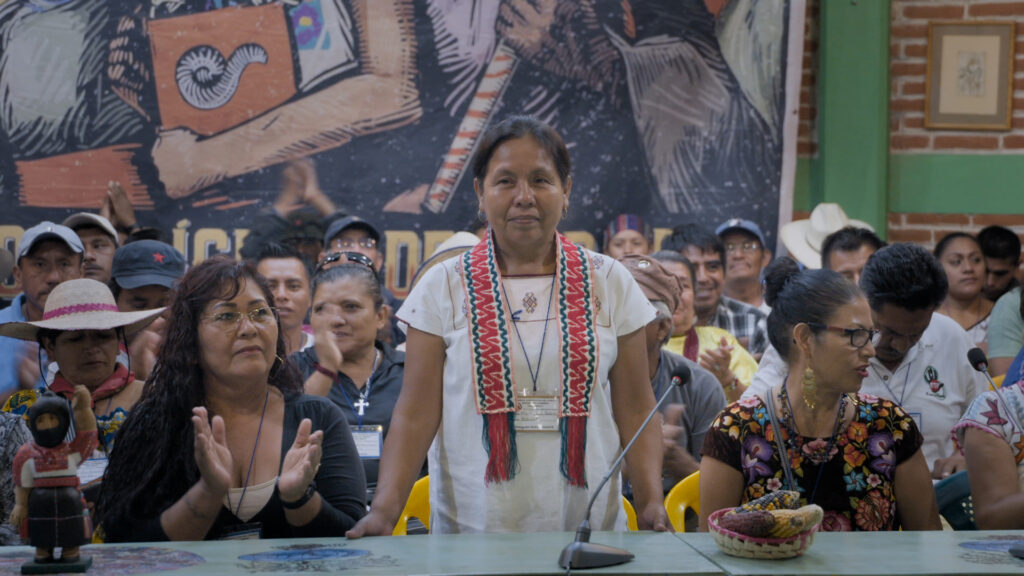Argentina-born, Mexico-based Luciana Kaplan has dedicated her career to documentary filmmaking and teaching. Her films have won support grants from the Fondo Nacional para la Cultura y las Artes, IMCINE, and Eficine, as well as international awards, such as the Al Jazeera Documentary Award in Vancouver and Best Documentary Film at Los Cabos Film Festival for “Eufrosina’s Revolution,” and the Best Mexican Documentary Award at Morelia Film Festival for “Rush Hour.” Kaplan is currently making her fourth documentary feature, “Invisibility Treaty.”
“The Spokeswoman” is screening at the 2021 Hot Docs Canadian International Documentary Film Festival, which takes place April 29-May 9. The fest is digital this year due to COVID-19. Streaming is geo-blocked to Canada.
W&H: Describe the film for us in your own words.
LK: “The Spokeswoman” a documentary film about María de Jesús Patricio — also known as Marichuy — the first Indigenous woman to run as an independent candidate for presidential elections in Mexico. Supported by the EZLN and the National Indigenous Congress (CNI), Marichuy’s political participation is totally different from the one we see in an average political candidate: it’s a collective proposal; a call to fight for life to defend the land and territories, addressing issues that no other candidates seem to care about.
Through the film, we witness her unique campaign while she travels, talks, and listens to different communities all over Mexico, calling for unity and self-government. In the end, a question pops up: progress for whom, and on the behalf of whom?
W&H: What drew you to this story?
LK: The amazing experience of documenting a historical event.
W&H: What do you want people to think about after they watch the film?
LK: I hope viewers rethink the world we are living in. If progress means destruction, is it really progress? We should reflect on our ways of living all over the planet, and Indigenous communities have a lot to teach us about that. It is a call to action.
W&H: What was the biggest challenge in making the film?
LK: Understanding the message Marichuy and the CNI was trying to give us; getting closer to our main character, in an intimate way; and constructing a clear, emotional, powerful piece with 300 hours of material were all major challenges. There were so many important, powerful, and interesting subjects that it was hard to decide which parts to put in or leave out of the cut.
W&H: How did you get your film funded? Share some insights into how you got the film made.
LK: It was mainly funded by Eficine, a state-run tax reduction program by which companies can give their taxes to films and art projects. It’s been a really successful program in Mexico. Just Films, the Ford Foundation, and Sundance also gave us extra funding, as “The Spokeswoman” was a big, expensive, and ambitious film to make. The project involved a lot of traveling around the country, research, and time in the editing room to find the right structure and message for the film.
W&H: What inspired you to become a filmmaker?
LK: Since I was young, my father took me to the movies to see, in particular, art films from all over the world. That opened a door for me to discover different worlds and other ways of living that completely formed the person I am today. Experiencing the magic of those films I saw in my formative years made me want to dedicate my life to telling stories that deeply moved me.
W&H: What’s the best and worst advice you’ve received?
LK: The best advice: Make films that make you feel alive, films that help you answer your own personal questions. Find yourself through filmmaking.
The worst advice: You need a lot of money and people to make films. It’s hard to make movies if you are a woman or a mother.
W&H: What advice do you have for other women directors?
LK: Don’t be afraid, do whatever your guts tell you. Don’t let any man or woman tell you who you are or who you ought to be — find yourself through filmmaking.
W&H: Name your favorite woman-directed film and why.
LK: Agnès Varda is my favorite woman filmmaker. She was a political, multifaceted artist and a true pioneer with a big concern and curiosity for other people’s lives. She was an amazingly creative and courageous woman, indeed.
W&H: How are you adjusting to life during the COVID-19 pandemic? Are you keeping creative, and if so, how?
LK: It’s been hard to keep producing during the last year, but I’ve been able to write proposals for the films I’m developing now. So in a way, I had more time and concentration than ever. Of course, as a documentarian, approaching people and conducting direct research is much harder now, but I think we are all learning more creative ways to make films.
W&H: The film industry has a long history of underrepresenting people of color onscreen and behind the scenes and reinforcing — and creating — negative stereotypes. What actions do you think need to be taken to make Hollywood and/or the doc world more inclusive?
LK: To call on people to read and travel more; to visit different communities all over the globe; to try to understand other points of view — I know it is hard to hear that, and it all sounds abstract, but for me, a lack of information on what’s going on in the world is what creates this underrepresentation of the human experience.







